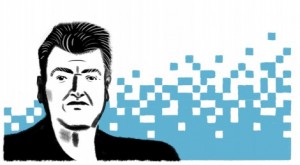In Andrew Keen’s Digital Vertigo (Introduction and Chapter 1), Keen understands and accepts the benefits of technological novelty before cautioning us of the dangers. Andrew Keen is a British-American entrepreneur writer, broadcaster and public speaker. He is an acclaimed speaker on the international circuit, speaking regularly on the impact of new technology on 21st century business, education and society. He cautions that social networking could have adverse effects that have not been well-thought-out by people. 
Keen argues we have moved on to a third wave. There is not just internet now but we are moving onto a social society; everything is moving onto the social sphere. We have moved from web 2.0 to web 3.0. Web 2.0 tended to be anonymous; web 3.0 is far less anonymous. By doing so people have not realized that by becoming connected we are disconnected and become isolated from one another.
What I glimpse that late November afternoon in Bloomsbury was the anti-social future, the loneliness of the isolated man in the connected crowd.
I agree with in saying that we have overlooked the ant-social aspect of social media. That in being everywhere we in fact nowhere.
Absolute unreality is real presence, and the completely fake is also completely real.
Digital technology has transformed
From being a tool of second life into an increasingly central part of real life.
I do think however it will be difficult to reverse this or make people aware of what is already happening. Society’s innovation is on a fast-track where we are constantly trying to create.
In an interview with The New York Times, (One on One: Andrew Keen, Author of ‘Digital Vertigo’) Keen was asked what should come next. His answer was to focus on privacy and make things perishable.
It should be like drawing something in the sand in the desert. Facebook won’t do this but others will and there are some of the smartest people I know working on new companies that focus on privacy.
Keen is currently the host of “Keen On”, the popular Techcrunch chat show. In an interview (Why Privacy is the Valley’s Next Big Thing) with David Cho (CEO and co-founder of Sidebark), they discuss Keen’s belief that 2012 will focus on privacy. Cho believes that his company will give us the security to share even our most sensitive data with our friends. In 2011, CHo said that 350 billion photos were taken but only 50 billion were shared on sites such as Flikr, Facebook, or Google +. The number one reason people did not share photos was privacy. Cho discusses two kinds of privacy: social privacy which is something found on Facebook. And institutional privacy which is trusting the company with the data given which can’t really be found with Facebook since it’s an advertising company.
I find that privacy is a little difficult with the internet. Even if it’s private, once it’s on the internet it’s there forever and available for those searching and hacking. Also, in a society were advertising is huge, will this privacy concept as a business model for a company, really take on and become a thing of the future?


This post does a good job of introducing and summarizing the book and the interview. I would like to see more original insight and specific commentary from you. That last paragraph, for example, ends just when it starts to get intriguing. Don’t forget to link to the reading.